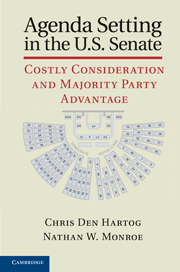Book contents
- Frontmatter
- Contents
- List of Tables and Figures
- Preface
- PART I COSTLY CONSIDERATION
- PART II SENATE PROCEDURE AND CONSIDERATION COSTS
- 4 Committees and Senate Agenda Setting
- 5 Scheduling Bills in the Senate
- 6 The Effects of Filibusters
- 7 The Disposition of Majority and Minority Amendments
- 8 Killing Amendments with Tabling Motions and Points of Order
- 9 The Effects of Amendments
- PART III TESTING THE COSTLY-CONSIDERATION THEORY
- Appendix A Relaxing the Model's Assumptions
- Appendix B Last Actions and Coding Amendment Disposition
- Works Cited
- Index
6 - The Effects of Filibusters
from PART II - SENATE PROCEDURE AND CONSIDERATION COSTS
Published online by Cambridge University Press: 07 October 2011
- Frontmatter
- Contents
- List of Tables and Figures
- Preface
- PART I COSTLY CONSIDERATION
- PART II SENATE PROCEDURE AND CONSIDERATION COSTS
- 4 Committees and Senate Agenda Setting
- 5 Scheduling Bills in the Senate
- 6 The Effects of Filibusters
- 7 The Disposition of Majority and Minority Amendments
- 8 Killing Amendments with Tabling Motions and Points of Order
- 9 The Effects of Amendments
- PART III TESTING THE COSTLY-CONSIDERATION THEORY
- Appendix A Relaxing the Model's Assumptions
- Appendix B Last Actions and Coding Amendment Disposition
- Works Cited
- Index
Summary
It sometimes seems that Senate observers perceive all (threats of) filibusters as similar to those of Huey Long, Strom Thurmond, Alfonse D'Amato, and Jimmy Stewart – that is, as insurmountable obstacles to the majority party agenda. Even from more moderate perspectives, scholars often characterize the chamber's legislative process as requiring 60 votes to pass any significant legislation, which is portrayed as a serious obstacle for the majority party that typically forces it either to give up on a proposal or to water it down so seriously that the resultant legislation does not clearly constitute majority party success.
We rethink this characterization. We agree that the filibuster presents the kind of obstacle just described under some circumstances; indeed, it is perhaps the most significant and consistent component of the majority party's consideration costs. We argue, however, that the filibuster does not present this kind of insurmountable obstacle under other circumstances. In many cases, the majority party is able to pay the consideration costs associated with breaking through or sidestepping a filibuster. We believe, moreover, that Senate literature focuses disproportionately on cases of the first type, creating a bias toward overestimating the extent to which filibusters undermine the majority party.
In the remainder of the chapter, we make our case by first analyzing the logic of potential filibuster fights, then presenting cloture and scheduling data consistent with our argument.
- Type
- Chapter
- Information
- Agenda Setting in the U.S. SenateCostly Consideration and Majority Party Advantage, pp. 99 - 111Publisher: Cambridge University PressPrint publication year: 2011



